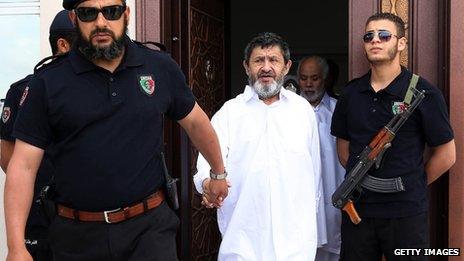Lockerbie compensation: Libyan officials acquitted
- Published

Two senior Libyan officials have been acquitted of "squandering public funds" by agreeing to pay $2.7bn (£1.7bn) in compensation to victims of the 1988 Lockerbie bombing.
Former Foreign Minister Abdul Ati al-Obeidi and former General people's Congress head Mohamed al-Zway have been on trial since September 2012.
Col Muammar Gaddafi agreed to pay the compensation in 2003.
These are the first verdicts against his officials since he was ousted.
The judge did not explain the reasons for the acquittal, says the BBC's Rana Jawad in Tripoli.
One of Mr al-Zway's relatives told the BBC the verdict showed that Libya had a fair judiciary.
"I'm happier with the judiciary than I am at the verdict," he said.
State prosecutor Sidiq al-Sour later told journalists that the pair would face separate charges over the "systematic repressive policies practised" by Col Gaddafi's government during the 2011 uprising which toppled him.
He said they would face charges such as forming armed criminal groups, inciting rape and illegally detaining individuals.
Col Gaddafi's son Saif al-Islam and spy chief Abdullah al-Sanussi would also face such charges in a trial due to start in August, he said.
Two hundred and seventy people were killed when a bomb exploded on Pan AM flight 103 over the Scottish town of Lockerbie.
Abdelbaset al-Megrahi was jailed in 2001 for the attack - he has always denied any responsibility.
Col Gaddafi accepted that Libya carried out the bombing but denied giving the orders himself.
He agreed to pay the compensation in order to get international sanctions on Libya lifted.
Megrahi was freed from a Scottish jail in 2009 on compassionate grounds after medical evidence showed he was dying of cancer.
He returned to Libya, where he was given a hero's welcome, and died in May 2012.
- Published1 March 2013
- Published23 February 2011
- Published20 May 2012
- Published20 May 2012
- Published20 May 2012
- Published23 October 2012
- Published20 October 2012
- Published13 September 2023